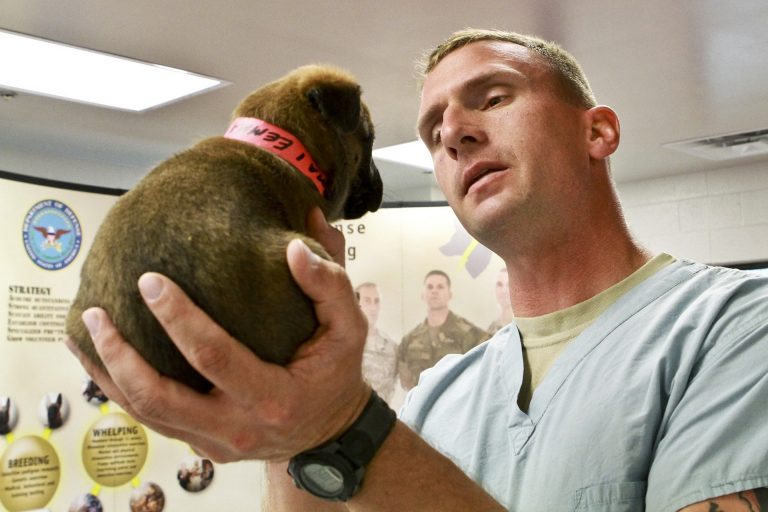
You may have heard of fellow dog owners mention this life-threatening emergency, but what exactly is puppy bloat?
Gastric dilatation volvulus is the scientific term for intestinal bloat in dogs. This happens when a puppy’s stomach rapidly expands with gas, fluids, or food. During the expansion of gasses, pressure is put on surrounding organs, sometimes causing a tear in the lining of the stomach.
In some cases of puppy bloat, the stomach will twist or rotate. When twisting occurs, blood cannot flow properly. As blood becomes trapped, it is unable to travel back and forth to the heart or other areas of the body. This can quickly send your dog into shock.
What are warning signs and symptoms of puppy bloat?
In a 1996 study published by Veterinary Surgery, between 40,000 to 60,000 dogs were estimated to have been affected by bloat in the USA, with a mortality rate as high as 33%.
It is important to catch puppy bloat in the early stages, since complications can lead to death if not taken immediately to a veterinarian.
Common signs of stomach pains in your puppy include the following:
- Restless behaviour
- Pacing
- Unproductive vomiting
- Collapse
- Excessive drooling
- Looking intently at their stomach
- Rapid heart rate
- Weakness/lethargy
- Swollen stomach
- Anxiety/nervousness (unusual to their temperament)
- Pale gums
- Shortness of breath
What to do if you suspect your dog is suffering from puppy bloat?
If you feel your puppy could be affected by bloat, please seek medical attention for them immediately.
Stay calm. Call your vet or get someone to call them while you get your vehicle ready. Transport your puppy to the vehicle, and safely make your way to the veterinarian.
The chances of surviving puppy bloat in 2019 has increased to 80%. Your puppy has a higher chance of living through this due to the advances in veterinary medicine, surgical techniques, and anaesthetic improvements.
Can puppy bloat be prevented if you take precautions?
Unfortunately, bloat can happen to any dog at any time. These 7 tips, however, may help prevent it from happening:
- Large-breed puppies are more susceptible. If you are unfamiliar with your puppy’s breed, a DNA kit can be purchased online.
- Hereditary factors are a huge indicator. Try to find out if any of your puppy’s relatives have suffered from bloat.
- Do not feed your puppy from an elevated bowl. Recent studies have found that elevated feeding increases the risk of puppy bloat.
- “Gulping” food is considered a risk factor. A slow-feeder bowl decreases the amount of air your puppy brings into their stomach when eating.
- Many owners claim that feeding a probiotic and digestive enzyme–rich diet can prevent bloat. Raw diets are also recommended by some.
- Do not feed large amounts of food your puppy is not accustomed to, since this can lead to greater amounts of gas building up.
- Feed your puppy small regular meals. A feeding schedule can greatly diminish the risk of bloat.
There is a lot of conflicting information on how to prevent this terrible condition, but as it stands, the best prevention is to familiarise yourself with the signs and symptoms of bloat.
For more information on the best way to feed your puppy, read our article “How to Create a Puppy Feeding Schedule.”